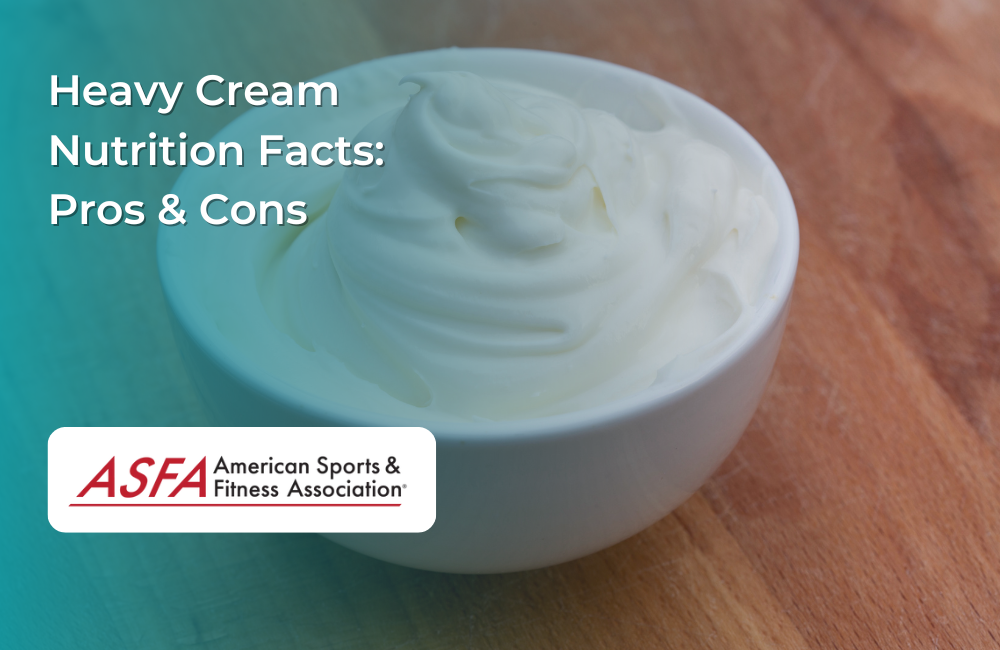Heavy cream is a dairy product known for its rich texture and high fat content. It is commonly used in cooking, baking, and coffee due to its creamy consistency. While heavy cream provides essential nutrients, it is also calorie-dense, making moderation key for those monitoring their diet. Understanding its pros and cons helps in making informed dietary choices.
Heavy Cream Nutrition Facts: Pros and Cons of Consuming Heavy Cream
High in Healthy Fats
Full fat dairy, such as heavy cream, contains a high amount of fat, including monounsaturated fats, which can support brain function and hormone production. When consumed in moderation, these fats contribute to overall satiety and energy balance.
Good Source of Essential Nutrients
Heavy cream provides several important vitamins and minerals, including:
-
Vitamin A – Supports vision, immune function, and skin health.
-
Calcium – Helps maintain strong bones and muscle function.
-
Phosphorus – Aids in energy metabolism and bone strength.
-
Vitamin D (in fortified versions) – Supports calcium absorption and immune health.
Additionally, heavy cream nutrition facts highlight its detailed nutritional profile, including its calorie content, fat composition, and nutritional benefits such as protein and certain vitamins and minerals.
Low in Carbohydrates
For individuals following low-carb or ketogenic diets, heavy cream is a popular choice because it contains minimal carbohydrates while providing a good source of fat for energy.
Additionally, its low carbohydrate content can be beneficial for weight loss diets.
Enhances Flavor and Texture in Recipes
Due to its rich consistency, heavy cream enhances the texture and flavor of soups, sauces, and desserts. It can be used in moderation to add creaminess without relying on processed thickeners or artificial additives. Whipped cream, made from heavy cream, further enhances the flavor of desserts and other dishes with its rich texture and sweetness.
Less Lactose Than Other Dairy Products
Heavy cream contains lower levels of lactose compared to milk, making it easier to digest for some individuals with mild lactose sensitivities. However, it is not completely lactose-free. For those with mild lactose sensitivities looking for a lighter alternative, half and half can be a suitable option due to its lower lactose content and creamy texture.
Cons of Consuming Heavy Cream
High in Calories
Due to its high fat content, heavy cream is calorie-dense. Consuming large amounts can contribute to excess calorie intake, which may lead to weight gain if not balanced with overall energy needs.
Additionally, some studies suggest that heavy cream intake might influence body fat distribution, potentially affecting belly fat.
High in Saturated Fat
Heavy cream is rich in saturated fat, which, when consumed in excessive amounts, may contribute to increased cholesterol levels and cardiovascular concerns. Moderation is important, and it should be balanced with sources of unsaturated fats. Research shows that replacing saturated fat with polyunsaturated fat can significantly reduce the risk of cardiovascular disease.
May Not Be Suitable for Lactose Intolerant Individuals
While lower in lactose than milk, heavy cream still contains some lactose, which may cause digestive discomfort in individuals with lactose intolerance or dairy sensitivities.
Not a Significant Source of Protein
Although heavy cream, called heavy whipping cream, is dairy-based, it contains minimal protein and is high in fat. It should be paired with protein-rich foods to ensure a balanced intake of macronutrients.
Can Be Overused in High-Calorie Dishes
Due to its creamy texture, heavy cream is often used in high-calorie, high-fat recipes. Overconsumption in combination with other rich ingredients may lead to excessive saturated fat and calorie intake. For those looking to consume less fat, consider using lower-fat alternatives like half-and-half or other lower-fat dairy replacements.
Conclusion
Heavy cream is a rich and flavorful dairy product that provides essential nutrients and healthy fats. While it is a good option for those following low-carb or high-fat diets, its high calorie and saturated fat content require mindful consumption. Using heavy cream in moderation allows for its benefits without negatively impacting overall health.
FAQs
Is heavy cream healthier than milk?
Heavy cream contains more fat and fewer carbohydrates than milk but lacks significant protein. It can be beneficial for those on low-carb diets when consumed in moderation.
Can heavy cream be used on a ketogenic diet?
Yes, heavy cream is commonly used in ketogenic diets due to its high fat and low carbohydrate content.
Does heavy cream contain lactose?
Heavy cream has lower lactose levels than milk but is not completely lactose-free. Those with severe lactose intolerance may need to avoid it.
How can I use heavy cream in a healthier way?
Using small amounts in coffee, soups, or recipes while balancing it with nutrient-dense foods helps maintain a healthy diet.
What are alternatives to heavy cream?
Coconut cream, Greek yogurt, and cashew-based creams are alternatives that provide similar textures with different nutritional profiles.
Canned coconut milk is also a healthy substitute for heavy cream, offering a lower-fat option with varying coconut content suitable for a wide range of culinary uses.





